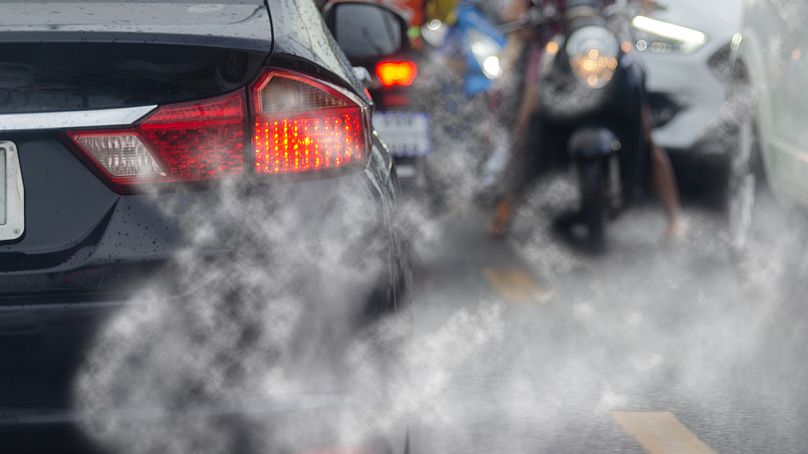Paris will ask residents to vote in a referendum on increasing the cost of parking for SUV later this year.
France is cracking down on heavy and polluting vehicles as it pushes people towards electric cars and public transport.
On 1 January, France tightened the rules for taxes paid when buying a new car.
The weight threshold for heavy vehicles was decreased from 1.8 tonnes to 1.6 tonnes meaning this extra charge will be applied to most SUVs or 4x4s. It costs €10 per kilogram for vehicles up to 2.1 tonnes and €30 per kg for vehicles heavier than 2.1 tonnes.
1/1
Skip Ad
Continue watching
after the ad
Visit Advertiser websiteGO TO PAGE
PLAY

Latest
Video Settings
Full Screen
About Connatix
V451188

Read More

Read More

Read More

Read More

Read More

Read More

Read More

Read More
What’s in store for Europe’snuclear energy?
 (new Image()).src = ‘https://capi.connatix.com/tr/si?token=604675c4-ea89-46c9-9817-5ed115e7bf41&cid=83b16131-8326-440c-9a78-470bcd2870e2’; cnxps.cmd.push(function () { cnxps({ playerId: “604675c4-ea89-46c9-9817-5ed115e7bf41” }).render(“29572e93412441b3b0dc992bd9167d8a”); });
(new Image()).src = ‘https://capi.connatix.com/tr/si?token=604675c4-ea89-46c9-9817-5ed115e7bf41&cid=83b16131-8326-440c-9a78-470bcd2870e2’; cnxps.cmd.push(function () { cnxps({ playerId: “604675c4-ea89-46c9-9817-5ed115e7bf41” }).render(“29572e93412441b3b0dc992bd9167d8a”); });
For most medium-sized SUVs, that could mean around €16,000 added to the upfront cost.
A tax on buying polluting vehicles has also been extended with emissions limits lowered to cover most petrol cars.
The surcharge starts at €50 and rapidly increases with higher emissions topping out at €60,000 for cars that emit 194 kilograms per kilometre. A cap of 50 per cent of the purchase price of the vehicles has also been removed which the government says specifically benefited very expensive and very polluting vehicles.
France is hoping that higher taxes dissuade people from buying heavy SUVs which create more pollution and are more dangerous for pedestrians or cyclists in collisions.
Electric cars made in Europe
The crackdown on polluting vehicles is also part of France’s push to sway people towards European-made electric vehicles and public transport in an effort to cut emissions.
Last year President Emmanuel Macron unveiled incentives for EV buyers including a €100 per month leasing scheme for electric cars made in Europe.
A green bonus also offers €5,000 (or €7,000 for low-income families) towards electric vehicles priced under €47,000. But in 2024, rules around which cars are eligible are being tightened and will now take into account the emissions produced in manufacturing and shipping the vehicle.
Though a majority of EVs sold in France are still on the list, the bonus now favours cars made closer to home with many manufactured in China – including Tesla’s Model 3 – not making the cut. By 2027, Macron said France hopes to produce around 1 million electric vehicles and open four new battery factories in the north of the country.
It isn’t just EVs the government is focusing on, however, with Macron also announcing a €700 million package for 13 commuter train projects in cities across France.
Back in September last year, the French President said that to reach EU targets to cut emissions by 55 per cent by 2030, the country needed to move twice as fast as it currently is.
“This whole strategy will enable us to reduce our dependence on fossil fuels, essentially coal, oil and gas… from 60 per cent to 40 per cent by 2030,” he added.
Could driving an SUV become more expensive in Paris?
Local governments in France are cracking down on drivers of heavy, polluting vehicles too and life could soon get more expensive for SUV owners in the capital city.
In February, Paris will ask residents to vote in a referendum on increasing the cost of parking for SUVs.
It would see non-residential parking charges for heavy vehicles triple to €18 an hour in the centre of the city and €12 an hour in the rest of Paris. The higher charges would apply to owners of petrol and diesel or plug-in hybrid cars that weigh more than 1.6 tonnes as well as owners of electric vehicles over 2 tonnes.
Paris Mayor Anne Hidalgo has said the new rules would target “very expensive cars, driven by people who today have not yet made the changes to their behaviour that have to be made”.
She added that it was a “form of social justice” which could raise €35 million for Paris while improving road safety and air quality and encouraging people to use public transport.
If Paris residents vote in favour of the new charges they will be introduced early next year. And a survey published in the French newspaper La Parisien this week found that 61 per cent of people in the city are in favour of increasing parking prices for SUVs.
Grenoble already has plans to introduce higher parking fees for heavy vehicles from 1 March and Lyon is also set to raise prices earlier next year.















